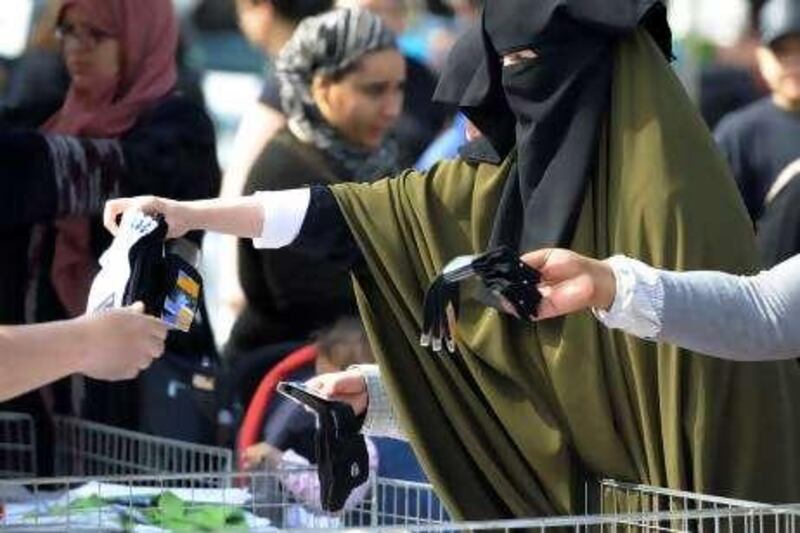JEDDAH // When Turki al Shabanah, a leading Saudi executive television producer, was asked which place he likes to go to the most in Riyadh, his answer was Riyadh International Airport. Many Saudis, such as Mr al Shabanah, are obsessed with travelling, but this year many people are rethinking their summer destinations, particularly since some European countries, namely France, have considered barring Muslim women from wearing veils.
On Sunday, two Saudi clerics declared that Muslim women are exempt from wearing full veils in France, although they added that women should probably avoid visiting the country as tourists. The comments by Mohamed al Nujaimi, a scholar, and Ayed al Qarni, an author and cleric, were published in Al Watan, a daily newspaper. They came two weeks after French legislators passed a bill under which women could be fined for appearing in public wearing the veil. "Tourism to western countries like France, while not forbidden, should be avoided in favour of Muslim countries where veils are allowed," the clerics said.
Travelling for leisure is not a necessity for people, therefore they have no reason to go to a country where they are forced to conform to a law that contradicts their own religious rights, the clerics said. Every summer, tens of thousands of Saudi holidaymakers leave the kingdom to spend their vacation in cooler climates. The Saudi commission of tourism and antiquity expects the number of Saudis travelling to Europe and the United States this year to reach 12 per cent of the total number of people leaving the country between July and September. Fifty per cent will go to Middle Eastern countries outside the GCC and 32 per cent will spend their holiday in GCC countries.
France is home to Europe's largest Muslim minority, a population of almost five million. It is thought that only about 2,000 women wear the full-length burqa or the niqab in France. The new law, which still has to be vetted by France's highest constitutional authority and approved by the Senate, could make France the second European country after Belgium to criminalise the veil. The opinions of Mr al Nujaimi and Mr al Qarni, while valued by many people, are not binding on the population because they are not members of the council of senior scholars.
Despite the weekend statements by the two clerics, many Saudis say they are against travelling to France this summer because they consider the ban an act directed at controlling Islamic beliefs and an abuse of their human rights. "Europe is making itself a target for religious groups if it continues to support France's step," said Waleed al Khair, a lawyer and human rights activist. "As long as the veil is not threatening national security, France has no right to ban it. I don't think that veil is a threat there now."
On the other hand, Mr al Khair criticised Saudi scholars who advise travellers not to go to France because travel is a matter of personal choice. Also, "al Nujaimi and al Qarni shouldn't have brought up this subject since obligating women to cover their faces is a matter that is still debatable among Muslim scholars," the Jeddah-based lawyer added. Saudis do not need to hear from scholars on these matters because most people know the redlines in Islam, said Mohammed al Qahtani, an IT manager in Abha.
"The bottom line is I'll not go there and I don't need a fatwa to be issued from a scholar to convince me not to go there," he said. "We are not closed-minded as people might think," he said. "My wife and mother they drive their own cars in my town near Abha, but things are different when it comes to forcing them to do something against their religious beliefs." "Religion is the only asset Saudis have," he said. "We've nothing more valuable than that asset and we will protect it from any abuse or interference."
Montasser al Rashidi, an Egyptian working as a senior account manager at a Jeddah-based public relations agency, took a similar view to that of Mr al Qahtani. Mr al Rashidi is a frequent traveller to France and Paris is one of his favourite cities in the world, yet he will not return if French law interferes with his religious belief. "I've never felt discrimination against Muslims in France and I hope that this new government's policy is not aiming at this," he said.
Some Saudi women said they still believe that France should not deprive them from wearing veils, even if in Islam there is a debate to whether veiling is a religious requirement. "I wear the veil in Saudi Arabia, but when I travel I take it off even when I go to a Muslim country," said Najlaa al Harbi, a Saudi journalist working for Al Watan. "Taking it off is not a problem if the law in France will oblige me to do so. However, France or any European country, shouldn't do this," she added.
Yomen Loqman, an female editor at the paper who does not wear a veil, said if Muslims want Europeans to respect their beliefs, then they need to do the same. "When Europeans come to Saudi Arabia they respect our culture and laws and I think we need to respect their own when we travel to their countries." wmahdi@thenational.ae





